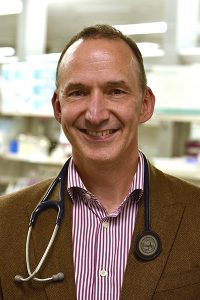Foreword
Metro North Health Executive Director Research Professor Daniel Chambers

Professor Daniel Chambers
I am delighted to present the 2021 Metro North Snapshot of Research. The Snapshot provides a glimpse of the amazing research activity happening everyday across our campuses.
I am very fortunate to be able to interact with many of you – our researchers – and it strikes me that something binds us all together – an unflagging and enduring love for research. I don’t think I’ve ever seen someone fall out of love with research, even after being jilted a few times – when a grant is not awarded, a paper turned down without going for review, or an experiment fails. Perhaps you have also reflected and asked the question ‘what is it that keeps me motivated despite the hurdles which are thrown up – what is the glue that binds us?’
For me it was the spark of discovery which triggered a lifelong love affair. I was studying nitric oxide biology in the 1990s. In a research study which today would make an ethics committee chair break into a cold sweat, I was measuring the nitric oxide response to cigarette smoking. From the data I gathered I realised I had discovered something which at that point nobody else on the planet knew. It was possibly one of the most inconsequential discoveries in the history of science, but it was mine and the thrill of discovery overwhelmed any objective evaluation of its significance.
Like many of you, I still love that feeling of discovery, picking up the many tiny clues which lead to a truly transformational new treatment or process: sometimes steadily, sometimes in great leaps, sometimes after meandering off course for months, and sometimes after hitting a dead end. But I have learnt through my career that research gives so much more. As a lung transplant physician, my research background has given me solace and confidence, sometimes in the middle of the night, when dealing with a complex, often time-pressured, clinical situation. A research background has equipped me with the capacity to critically analyse the literature to guide my patient to the best outcome. Or, if there are no answers in the literature, it provides the tools and the context to find them.
These benefits have been well studied. Research and the methods which underpin it are well known to foster and encourage critical thinking – in my view the most valuable but least tangible benefit of undertaking a research higher degree. In a health service context, research is the engine of evidence-based care. Research is the driver of improved clinical outcomes. Research guides efficiency and cost-effectiveness. And research delivers ground-breaking new treatments and shows us how to implement them for the greatest benefit.
And therein lies the danger. The benefits of research are so diverse, pervasive, and woven into the fabric of our health service that they are easy to overlook and underappreciate. Consider for a moment a health service devoid of research. Imagine a health service workforce without the capacity to think critically, where our workforce, practices and processes are rigid, automated, reactionary, and inflexible. Imagine a health service blind to, and unable to quantify, the benefits and risks of the services it offers. Imagine a health service where there are no new or improved treatments or processes. Imagine a health service which is paralysed when the rulebook is torn up or new unexpected challenges emerge out of nowhere. This future is unconscionable but real unless we protect, nurture, encourage and value our clinician researchers, scientists and research enablers.
I, like you, am not spooked by the health challenges we face now and into the future, because I know that research, coupled to education, will show us the way. It has before and it will again. As clinician researchers, scientists undertaking clinical research, and research enablers, we all know these things to be true. In the health service context, it is of course sometimes necessary for research to take a back seat to what may be the more pressing clinical issues of the day. However, we can’t lose focus on the long game. It is vital that we maintain an innately innovative focus, that we question what we do, that we heed the lessons that our learning healthcare systems teach us, and that we are ready to embrace change. These are the benefits of a research mind working in the clinical arena, and I’m sure you recognise them, since research and clinical work are inseparable. Since the life sciences remain full of mysteries and yet to be made discoveries, the truth is that we are all researchers. We have been so since the moment we commenced work in the health service and will remain so until there are no more mysteries to unravel.
Professor Dan Chambers
Executive Director, Research
Metro North Health
RESEARCH SNAPSHOT 2021
- Foreword
- Research Coordinator Grants
- Collaborative Research Grants
- A message from the RBWH Foundation
- A message from The Common Good
- Metro North Research Excellence Awards
- Research stories
- Technology and advanced manufacturing reducing pressure injuries
- Jamieson Trauma Institute leads ePMD safety with research
- Helping bone marrow patients live longer
- ‘Research yarning’ is helping to improve health outcomes for Aboriginal and Torres Strait
- Virtual reality trial opens potential new therapies for acquired brain injury
- HBI’s 3D printing and modelling improves patient care
- Caboolture Hospital set to lead ICU clinical trials across Queensland
- Nature may hold key to life affecting lung disease
- Redefining risk for heart attack patients
- Room service model research highlights patient and hospital benefits
- Strengthening Redcliffe Hospital’s research culture
- Community-based research takes a major leap forward
- Translating research into evidence-based aphasia therapy for patients
- Oral health collaboration focuses on improved ICU patient outcomes
- Understanding benefits and burdens of colonoscopy in frail older people
- Guidelines for nutrition post trans-oral robotic surgery
